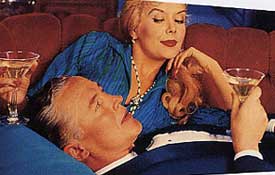Documentathon
Errol Morris has only directed seven documentaries. That seems impossible to me. He has to be the world's most gifted and celebrated documentary filmmaker (I am discounting Ken Burns, whose 20-hour televised series are a genre unto themselves) — and somehow seven feels like too truncated a number for a director whose career spans 25 years, and whose work has profoundly altered the face of nonfiction film.
I saw A Brief History of Time before I knew who Errol Morris was, before I understood where he was coming from. Expecting something along the lines of Cosmos, I remember being somewhat disappointed that the film was more about Stephen Hawking himself than his ideas.
But that's Morris — all of his films deal with quirky, fascinating subjects, but he always trains his focus on the people, not the subject matter. What he has mastered is not so much the documentary as the character study.
Gates of Heaven is the film (Morris's first) that really turned the genre on its ear. On one level, it delivers all the weirdness and color one would expect from an up-close look at pet cemeteries, yet there's an inescapable dose of truth and reality beneath the quirkiness — angst and sadness and even anger, all of which have nothing to do with the topics of pets and cemeteries, but everything to do with the fact that Morris leaves his camera running long enough to really capture the people as people. He is very careful not let these characters come across as caricatures.
The Thin Blue Line remains one of the most effective and influential documentaries of our time, because it catalyzed actual change, eventually getting an innocent man off death row. While Michael Moore's yearly broadsides at corporate, social, and political injustice seem to accomplish little beyond galvanizing the Left and aggravating the Right, Morris's razor-sharp examination of a single injustice actually found traction and led to the righting of a serious wrong. He once referred to this powerful little film as “the first nonfiction film noir.”
Mr. Death is a fantastic film, the one that really sold me on Morris's talent. Again, it presents itself as the story of a man with a bizarre claim to fame (Fred Leuchter pioneered advances in execution technology), but it's really the sad and deeply personal story of a man undone by the allure of fame and celebrity. Somehow, Leuchter's national status as a designer of electric chairs and injection machines is perverted into an undeserved reputation as a “forensic expert” on execution, and it isn't long before revisionist historians get their hooks in him, and he's making unqualified assertions that no gas was used at Auschwitz — after which, of course, he finds himself very much ostracized and abandoned.
Morris received his only Oscar nomination (and won) for The Fog of War in 2004. This in-depth conversation with Robert McNamara plays somewhere between a memoir, a lecture, and a confession, and offers a rare look at the Vietnam War from the point-of-view of the policy makers and armchair generals. For a war so often depicted in film as total madness, it is particularly fascinating to hear a thoughtful and reflective recounting of the many little decisions, rationales, and mistakes that snowballed into biggest American fiasco of the 20th century, and to hear them from a man who was in the room, influencing those very decisions.
I just watched Fast, Cheap & Out of Control for the first time yesterday — it is Morris's fifth documentary, and quite possibly his most brilliant work. In this one he examines the careers of four men with nothing in common, except that each is a highly qualified expert is a bizarre field: a lion tamer, a robotics engineer, a topiary gardener, and an expert on the social behavior of the hairless mole-rat. It sounds very much like a goofy study on eccentricity
 (and the DVD box even sells the film as “a fascinating portrait of four obsessed eccentrics ... a compelling, kaleidoscopic look at the very thin line which separates madness from genius”).
(and the DVD box even sells the film as “a fascinating portrait of four obsessed eccentrics ... a compelling, kaleidoscopic look at the very thin line which separates madness from genius”).But that's not really so. The four men Morris interviews are, in fact, exceptionally professional, thoughtful, balanced individuals. As people, they are not particularly colorful, but they each possess more knowledge, experience, and expertise in their peculiar fields than could ever be passed on or documented. And to a man, they are all extremely matter-of-fact about their work. It's really a study of the rewards of personal dedication and steadfast patience, of finding that one thing and devoting your life to it. In many ways, Mr. Death is a companion piece to this film, as a look at what happens when a similar kind of individual allows himself to be distracted from that one thing.
The most brilliant apsect of Fast, Cheap & Out of Control is the way Morris layers and intertwines the worlds of these four men. At one point, we may hear the engineer talking about his attempts to get his robots to work collaboratively, even socially, but the images we see are of the colony of mole-rats going about their business. Or, the lion tamer will emphasize the importance of knowing every detail of each cat's individual personality, while we see the
 gardener carefully trimming detail into the face of a giant topiary bear. Morris so effectively braids their stories together that it almost feels like we're looking at four alternate incarnations of the same person.
gardener carefully trimming detail into the face of a giant topiary bear. Morris so effectively braids their stories together that it almost feels like we're looking at four alternate incarnations of the same person.So now, Vernon, Florida is the only Errol Morris documentary I haven't seen (and it's his second-highest-rated film on IMDb). I'm going to have to correct that oversight right quick.





0 Comments:
Post a Comment
<< Home